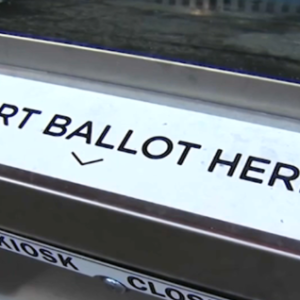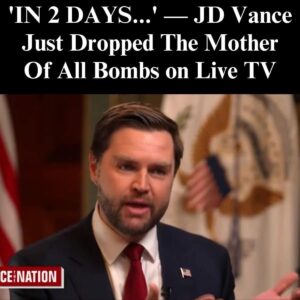In a dramatic turn of events during a press conference on Thursday, President Joe Biden figuratively threw his Vice President, Kamala Harris, under a bus amid the chaos of Hurricane Milton. The incident—one of many that have fueled intense political debate—centered on differing approaches to crisis management in Florida, marking the second major storm in as many weeks.
The Spark: A Clash Over Crisis Management
Earlier this week, Vice President Harris leveled serious criticisms against Florida Governor Ron DeSantis. According to Harris, DeSantis had refused her phone call, accusing him of “playing political games” instead of focusing on his sworn duty to protect the people of Florida. In response, Harris described his actions as “selfish” and lacking the necessary commitment to handle the state’s emergency effectively.
However, President Biden quickly pivoted away from his vice president’s remarks during a press briefing, offering strong praise for DeSantis’ efforts. “The governor of Florida has been cooperative,” Biden affirmed. “I talked to him again yesterday and I said, ‘No, you’re doing a great job. It’s all being done well. We thank you for it.’”
DeSantis’ Rebuttal: Focus on the People
At a subsequent news conference, Governor DeSantis dismissed the notion that he was engaging in political games. “She’s the first one who’s trying to politicize the storm,” he said. DeSantis stressed that his focus was entirely on managing the crisis—preparing for Hurricane Milton, orchestrating rescues, and overseeing power restoration efforts. “I’ve got people whose lives are on the line, I’ve got people whose homes and possessions are on the line,” he declared, emphasizing that his office was working around the clock, 24/7, to ensure public safety.
DeSantis further noted that he had been on emergency footing for two weeks straight and recalled his experiences managing hurricanes under both President Trump and President Biden. “Neither of them ever tried to politicize it,” he added, drawing a sharp contrast between his practical approach and the political bickering emerging from Washington.
Biden’s Perspective: Unity Amid Crisis
During his address on Fox & Friends, President Biden stressed the importance of unity and cooperation during the storm. He acknowledged that governors from Florida to North Carolina had been “fully cooperative and supportive” in their efforts to mitigate the impacts of Hurricane Milton. “Every governor, every governor has been doing an incredible job,” Biden said, reaffirming his belief that the federal and state governments must work together in times of emergency.
Biden’s comments were meant to refocus the narrative away from partisan squabbles and onto the shared goal of protecting American lives. His message resonated with many who see the current political debate as a distraction from the urgent work of disaster management.
The Political Fallout: A Divided Response
The heated exchange has ignited a firestorm on social media and in political circles. Some Republicans have lauded Biden’s support for DeSantis, viewing it as a refreshing acknowledgement of effective crisis management. Others, however, have sided with Harris, arguing that her criticisms highlight a broader issue of political interference in emergency responses.
Critics of Harris assert that her attempt to reach out to DeSantis was an unnecessary politicization of a dire situation. “We have been on an emergency footing for two weeks,” one commentator tweeted. “Our focus should be on saving lives, not on political games.” Meanwhile, supporters of Harris believe that holding public officials accountable for their actions—even in crises—is essential to good governance.
The Broader Context: Politics in the Age of Crisis
This latest dispute is emblematic of a broader national debate over how political leaders should navigate crises. In a time when natural disasters are becoming more frequent and severe, effective, non-partisan leadership is crucial. The controversy underscores the delicate balance between holding public officials accountable and ensuring that political differences do not hinder disaster response efforts.
Biden’s and DeSantis’ firm stance on prioritizing public safety contrasts sharply with the partisan bickering that has characterized much of recent American politics. The situation in Florida serves as a stark reminder that in times of crisis, the focus must remain squarely on the welfare of the people, rather than on scoring political points.
Looking Forward: Will Politics and Public Safety Ever Mix?
As Hurricane Milton continues to impact Florida, the focus now shifts to the unfolding disaster response. The cooperation between state and federal agencies remains critical, and both President Biden and Governor DeSantis have reiterated their commitment to safeguarding communities in the storm’s path.
Yet, the political fallout from the exchange between Harris and DeSantis raises questions about the future of bipartisan cooperation in times of national emergency. With intense scrutiny from the media and the public, the ability of political leaders to set aside their differences and work together for the common good is more important than ever.
Amid the turmoil of Hurricane Milton and the ongoing debates over public safety and political accountability, one thing is clear: the well-being of the American people must take precedence. President Biden’s supportive remarks for Governor DeSantis, combined with DeSantis’ unwavering focus on managing the crisis, highlight the importance of unity during times of emergency.
As discussions continue and political lines are drawn, it remains essential that both federal and state leaders work together seamlessly. The current exchange between Kamala Harris, Ron DeSantis, and the President is a reminder that, despite political differences, the real work lies in ensuring that every American is safe and protected in the face of disaster.
What do you think about the latest political fallout surrounding Hurricane Milton? Should politicians keep their partisan differences out of crisis management, or is accountability necessary even in emergencies? Share your thoughts on Facebook and join the conversation.
In these challenging times, let’s focus on what unites us—the shared goal of protecting lives and building a resilient future. Amid political debates, the priority remains clear: our communities must come first.





